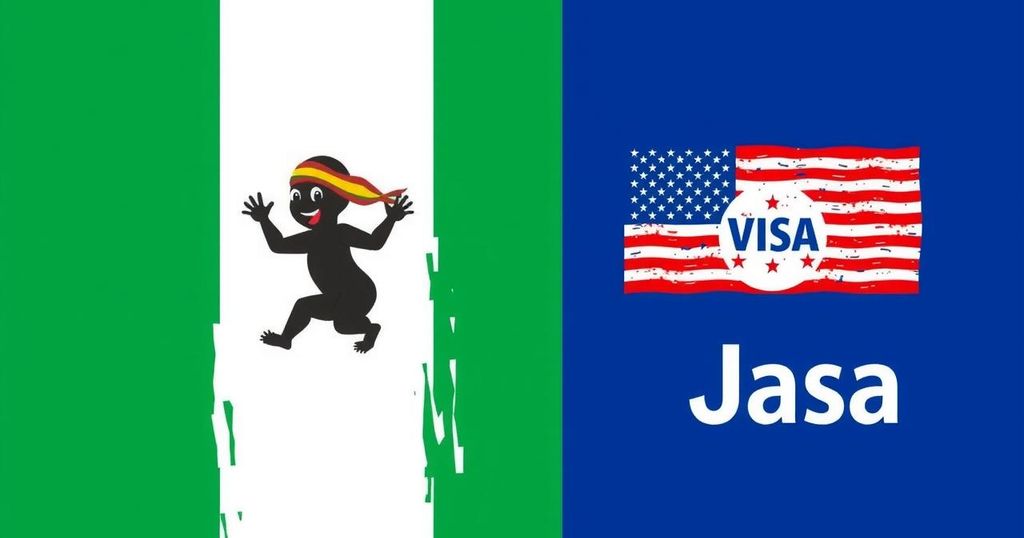A recent U.S. government report reveals that Ghana has surpassed Nigeria in visa overstays for the year 2023, particularly in B1/B2 and student visa categories. Ghanaians displayed a 7.50% overstay rate on B1/B2 visas and a staggering 21% for student visas. Conversely, Nigeria recorded a 7.14% overstay rate for B1/B2 visas and a 15.60% rate for students, highlighting shifting trends in visa compliance between these two nations.
According to a recent report by the United States Government concerning visa overstays for the fiscal year 2023, Ghana has surpassed Nigeria in the misuse of B1/B2 and F, M, and J non-immigrant visas from October 2022 to September 2023. The report details the rates at which individuals overstayed their visas, indicating a concerning trend of visa abuse. Overall, there were 510,363 suspected in-country overstays, which constitute 1.31% of expected departures, along with 54,792 out-of-country overstays, accounting for 0.14% of expected departures. In 2023, Ghanaians were granted 25,454 B1/B2 visas, with 1,910 individuals overstaying their visas, culminating in a 7.50% abuse rate. Moreover, the abuse rate for student and exchange visitor visas (F, M, J) for Ghanaians was significantly higher at 21%, with 537 out of 2,559 visas resulting in overstays. In contrast, Nigerians were issued 84,051 B1/B2 visas, with a slightly lower abuse rate of 7.14%, as 6,000 overstayed their permitted time. The report further highlighted that Nigerian students had a 15.60% overstay rate in comparison to Ghana’s higher 21% for the same visa category. Historical data illustrates that Ghanaians had a better record for visa compliance prior to the pandemic, reflecting a significant shift in trends. For context, in 2019, Ghanaians had an overall B1/B2 overstay rate of 5.09%, while Nigerian statistics showed a higher rate of 9.88%. Additional comparisons reveal visa abuse rates from other African countries, such as Mali and Togo, showing varying levels of compliance. An overstay occurs when a nonimmigrant remains in the United States beyond their authorized admission period, whether due to not departing or exceeding their visa duration. The U.S. Customs and Border Protection distinguishes between suspected in-country overstays and out-of-country overstays, enhancing their data analysis tools to obtain more accurate insights into visa compliance. This report raises crucial questions regarding immigration policies and the need for effective monitoring to ensure compliance with U.S. visa regulations. By highlighting the disparities between countries, it identifies the urgency for comprehensive assessments of visa issuance practices and enforcement mechanisms aimed at reducing visa abuse.
The issue of visa overstays presents a significant challenge for the United States’ immigration system. Visa overstay refers to the unauthorized remaining in the U.S. beyond the permitted time granted by immigration authorities. Recent data from the U.S. government highlights trends surrounding overstay rates among various nationalities, particularly focusing on those from Ghana and Nigeria. Understanding these statistics is critical for policymakers aiming to address immigration concerns and implement strategies to reduce non-compliance with visa regulations.
The 2023 visa overstay report indicates a troubling trend wherein Ghana has overtaken Nigeria concerning the abuse of certain non-immigrant visas. The statistics reveal rising overstay rates among Ghanaians, particularly in student and exchange visitor categories, previously demonstrating a more compliant record. This shift exemplifies the urgent need for revised strategies in monitoring and enforcing visa regulations to curb the misuse of U.S. immigration processes and ensure adherence to lawful entry and stay protocols.
Original Source: www.ghanaweb.com







